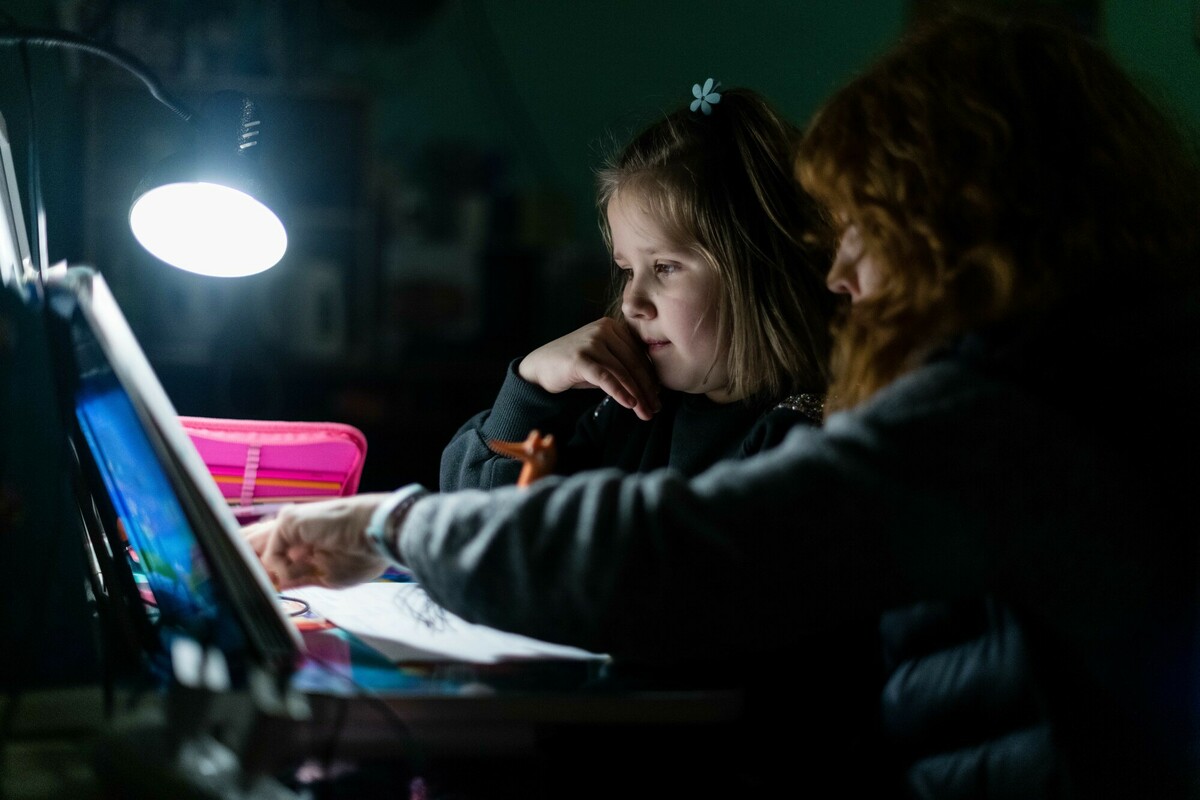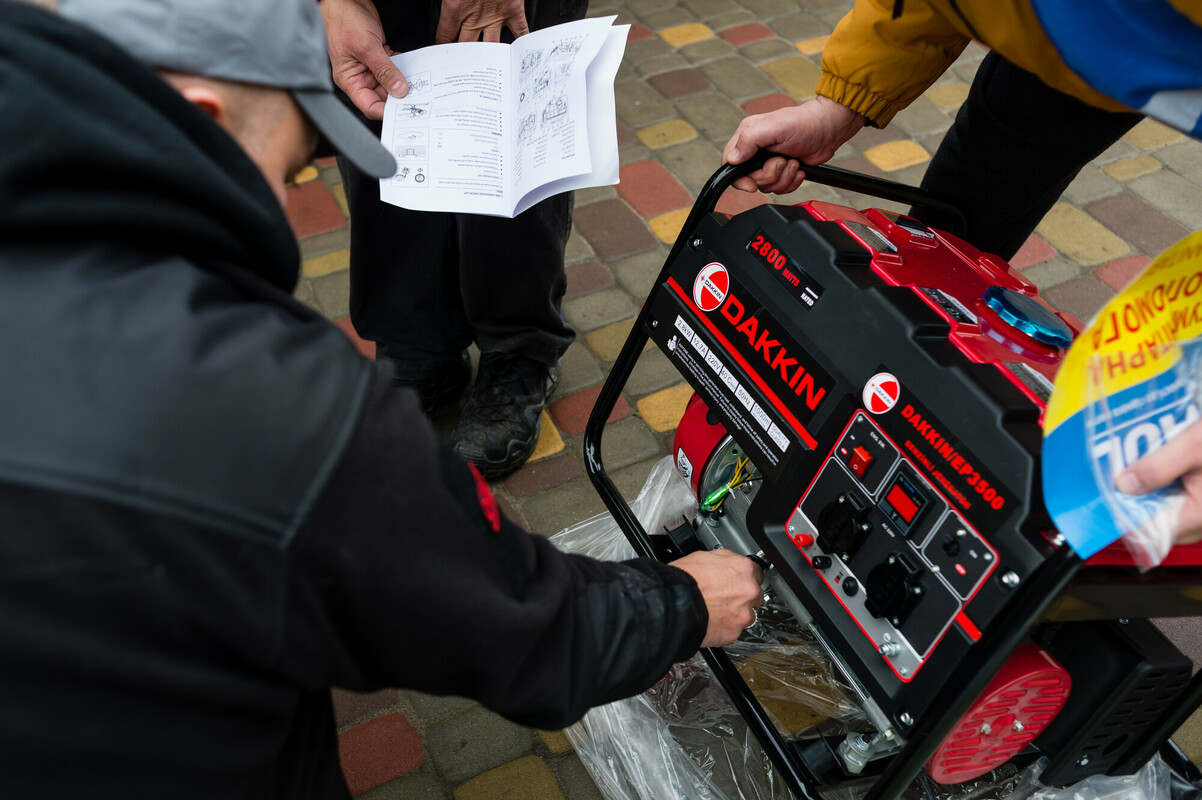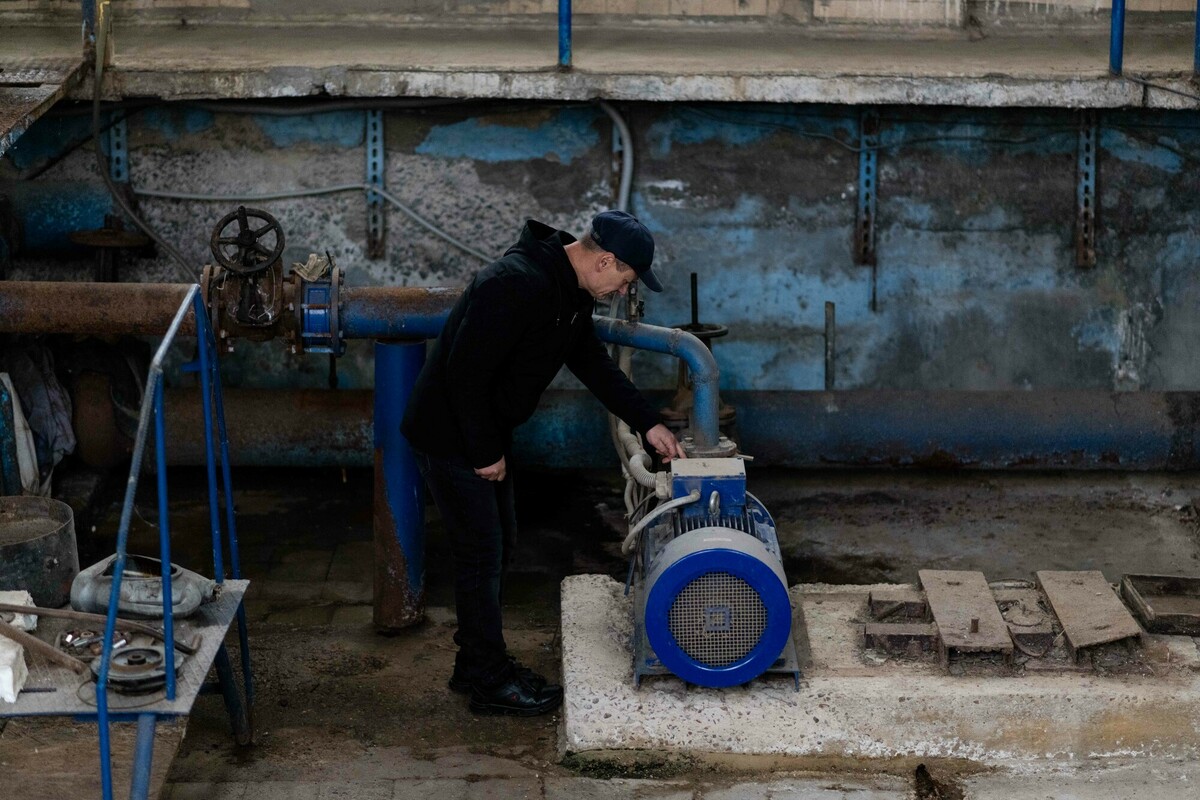Nobody would describe life in the underground shelter where Mavka* and her eight-year-old daughter Olesia* live as easy. But at least Depaul International, funded by DEC charities CAFOD and Plan International, brought them food and other supplies like toothbrushes and toothpaste.
They had fled there in the early days of the conflict and stayed ever since, along with several other families. The parents realised that the children needed a routine and got them up and ready for online schooling every day.
But in October 2022, an abrupt change of military strategy saw energy infrastructure hit by sustained missile and drone strikes across the whole of Ukraine. Knocking out electricity and heating ahead of the freezing winter dramatically worsened the humanitarian situation across the country – another twist in a crisis that has continued to throw up new challenges throughout the year.
Quickly adapting their plans, in November Depaul used DEC funding to install a generator and make winter repairs to the shelter as well as providing blankets. Reliable electricity means water in the taps and the ability to warm it up to wash the children. And it also means Olesia can keep attending school online.

“We have electricity here so there’s an opportunity for our children to have an education: the school year has started and Olesia is now in Year 4,” said Mavka. “There is hope for our kids’ future here now. They can continue learning so that they can have a better life.”
Aid organisations had long been planning for the cold winter months in Ukraine, where temperatures can reach –20°C and many homes have been badly damaged, but the targeting of the power grid required a radical rethink.
“We were already planning for winter in July,” says Sarah Hilding der Weduwen, Head of OCHA, the UN’s humanitarian organisation, in Ukraine. “We were forward-thinking – we knew it was going to be cold. But then the attacks on infrastructure completely changed the nature of the conflict. All the winterisation needs were exacerbated. We know they are going to need heating, blankets etcetera, but with attacks the needs massively grew. More people needed assistance, with some leaving their homes. We have to be constantly on our toes.”
The DEC’s flexible funding, which allows member charities and their partners to quickly adapt their programmes to fit changing needs on the ground, was vital at this stage of the response.
“The key is flexible planning, so we can decide from moment to moment whether we will spend [funds] on a generator for power banks, or for food kits, because the needs change constantly,” says Yulia Sporysh, CEO of ActionAid partner NGO Girls. “[The DEC] is very flexible and has very flexible conditions and we can redirect money easily.”
“The DEC is such a unique donor,” says Willow Rook, Deputy Country Director for Ukraine at DEC member Action Against Hunger “It's really valuable to us here on the ground, because [of] how flexible it is and how responsive it is to the needs."
“Every time that we see new needs, that we see change in contexts, working with the DEC makes it so easy for us to be able to present evidence, present information, we want to try a different approach, we want to work in a different area,” she adds. “And being able to know that with the DEC it's a relationship and not a one-way service provider-type agreement is really valuable.”

Using this flexibility, DEC charities are working with local partners like Depaul to distribute and install generators – from small portable models to larger ones that have the capacity to power shelters – to provide electricity to keep people warm and connected. Some organisations have also provided firewood to see people through the winter in rural areas where gathering it is dangerous due to the presence of landmines.
The winter so far has been relatively and mercifully mild but that has still meant sub-zero temperatures at times, which in a country where many buildings have been damaged or had their windows blown out can be a matter of life and death. There are concerns the temperature could drop further over the next two months.
Guiliano Stochino-Weiss, field coordinator for HEKS/EPER, a local partner of Christian Aid based in Dnipro, says they have made cash payments available to more people because a wider range of people are now at risk. “Now it’s winter we are taking off vulnerability criteria and doing blanket support with the multi-purpose cash assistance,” he says, “because there are some communities that are quite literally freezing to death.”
Mariya Tuzyk, project co-ordinator for Posmishka UA, funded by Concern Worldwide, echoes that sentiment: “We’re still in a state of emergency looking at people potentially not surviving this winter. This is the biggest emergency response that we need to look at right now.”
The disruption to the power grid has far-reaching consequences. Action Against Hunger is procuring battery-operated medical equipment that can temporarily operate without power. Food safety is affected as freezers stop working and people are unable to cook. DEC charities are adapting food kits to include tinned and dried goods that do not need heating or refrigeration.
Direct cash payments to people in need – a major part of the DEC-funded response – have also been disrupted. Payments made electronically have been delayed and in-person registrations and distributions have become difficult as freezing temperatures mean municipal buildings are sometimes too cold or air raid sirens send people running for shelters.

The blackouts and increased airstrikes across Ukraine have hampered the work of DEC charities and their partners more generally too. “Sometimes there is electricity in our office and sometimes there is not,” says Marysia Zapasnik, Country Director for Ukraine at DEC charity International Rescue Committee. “There have been times when we have only had two hours of electricity in a day and that was between two and four in the morning.”
Yuliya Sporysh, from NGO Girls, an ActionAid partner says: “Our finance team can be without light and internet for 12 hours, so it's of course impacting all our projects and activities. But we try to adapt. It also creates additional pressure on our mental health because every moment you are waiting for an air siren or for cold days without electricity and heating or for lack of internet.”
“Last week I was sitting in a dark corridor for hard shelter,” says Willow Rook of Action Against Hunger. “Just sitting for three or four hours. The power had gone out. It's below freezing here right now. And we were feeling the walls shaking with some explosions and still on our laptops, trying to take meetings and trying to send emails and trying to get work done.”
Despite the huge professional and personal challenges of this phase of the response, aid workers are steadfast in their commitment to their work. “We are determined to stay and deliver here,” says Zapasnik.
While the bombing of buildings and power stations has been vividly broadcast to the world, disruption to the water supply is less easily pictured but still has a devastating impact on civilians.
The shelling of reservoirs, water tanks and water treatment facilities caused severe damage to water and sanitation networks across Ukraine, while power cuts caused pumps to fail and damaged pipes.

To ensure people had access to clean drinking water, DEC charities supported water boards and provided pumps for mains waterpipes, hand and power tools for repairs, as well as bottled water to health facilities and schools where supplies had been affected. They also provided water treatment units, tap stands, water tanks and treatment chemicals. Sewer pumps, sewage cleaning equipment and chemicals were provided to treat waste water. Overall, DEC funds saw 1.9 million people gain access to clean water in the first six months of the response.
In one example, Oxfam used DEC funds to repair and upgrade the water system for a town in Odesa region after it had been damaged by a missile strike. The system was already struggling under the increased demand for water due to the number of displaced people arriving in the area. Oxfam worked with the local authorities and water utility, providing an engineer, generators, pumps, electrical equipment, pipes and cables to restore the water supply and sewage system for 73,000 people as well as a local hospital, and to ensure it works even during power cuts.
“This is very good, water is a basic need,” said Veronika, a displaced foster mother to 10 children who fled Luhansk in February 2022, who now benefit from the water project. “People need to have access to good quality water. Thank you so much for doing such a great job for the town.
“To all the funders and people who helped us, thank you so much,” she adds. “Without your support in this difficult time, we would have really struggled.”
*Names changed to protect identities.